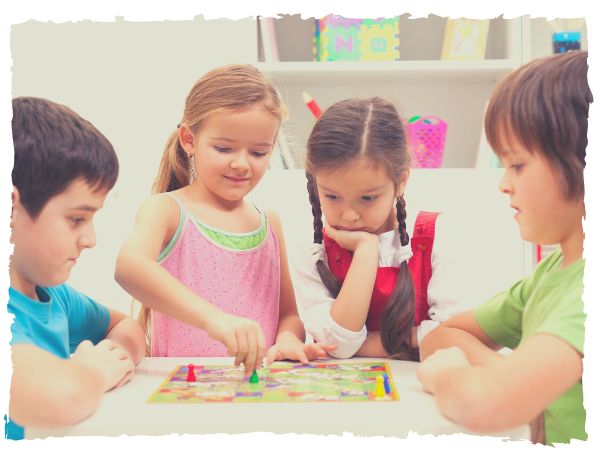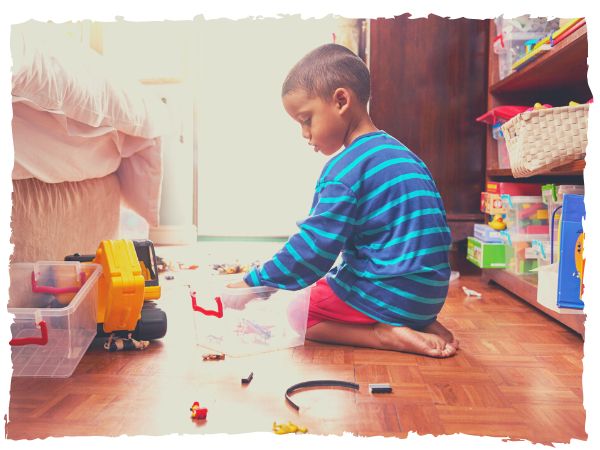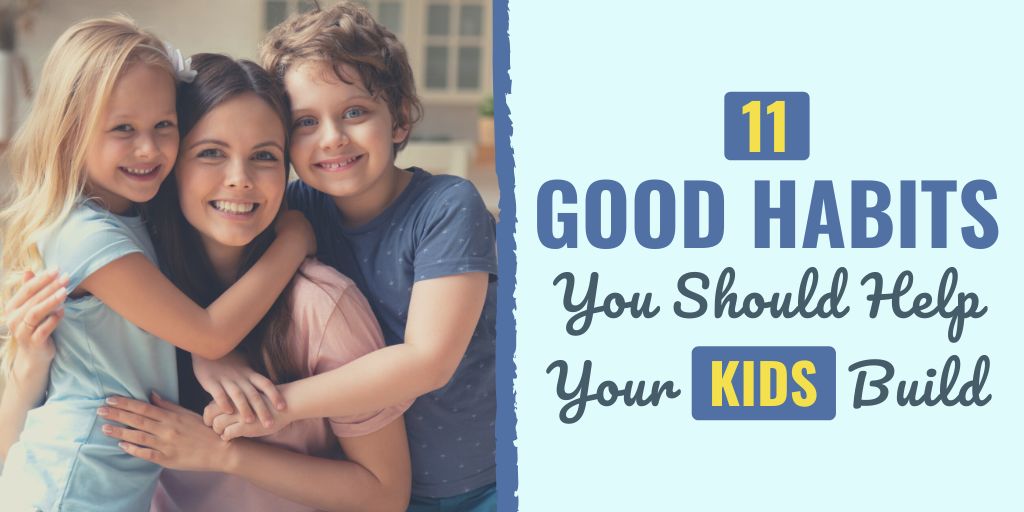Recently, I took charge of two young kids who needed some remedial schooling. One of the first things I noticed was that these two youngsters had a few bad habits, and they also hardly had any good habits.
Planning what I would be teaching them in the week ahead, I also began to wonder what habits they should be developing to help them succeed in life, and more importantly, how to teach these habits to the kids.
A friend, who is a developmental psychologist, had some amazing advice for me to follow, and within a few days, I already began to see an improvement. Do you want to teach some good habits for kids that will help them be so much better at everything in life? Read on.
Why Are Good Habits Important?
A habit, as you know, is something you do without thinking. You can only do this because you have been doing the same action for more than 90 days and the action is working for you. There has to be a reward. Sadly, bad habits also offer a reward, such as getting out of a situation that feels stressful.
Good habits are habits that help you do things that are beneficial to you. These habits assist you in being more successful, better adjusted to life, and generally better off in everything.
As you can imagine, a good habit is vital as it helps you succeed. Good habits aren’t just there to give you a quick fix. Instead, good habits help you really learn, overcome, and rise above life’s challenges.
For children, developing good habits is essential as it prepares them for life, gives them the tools to succeed, and guides them on the best path for living.
Why Children Learn Good Habits So Easily
Children are essentially sponges that soak up whatever they are surrounded by. If a child is exposed to an environment where there’s loads of swearing, they will also begin to swear as they do it without even thinking. Children learn habits easily, and bad habits can be learned even more easily as kids are surrounded by habit enforcers.
With a small amount of effort, a child can also learn good habits. Children learn habits quickly because they learn through repetition. Since they are clean slates, habits can quickly become written in their minds.
Teach Good Habits to Avoid Bad Habits
When you teach good habits from a young age, you encourage your child to develop great habits as an adult, and you help them avoid forming bad habits. Helping your child understand that good habits help them live a better life can also help them choose good habits over bad ones.
There are several great habits that a child should learn and cultivate in their lives. These habits are real winners for when your kids are all grown up too.
Habit 1. Please and Thank You
Children who have great manners grow up to be polite adults, which is a massive plus point for them. Teach children to say please and thank you as a habit. While you can teach it as a type of “rhyme” that they just memorize, it will have little meaning to them and you'll be creating a routine, not a habit. So understanding the “why” of being polite is important.
Please and Thank You Action Item
Teach your children about the simple pleasure of these three words: “please” and “thank you.” A simple activity of making a list of all the things they are thankful for each day can help them focus on when something is done for them that merits gratitude and a thank you.
Gentle reminders throughout the day of when their manners slip is also a great way to set their feet on the path of politeness.
Habit 2. Give Your All
Another great habit to teach your children is to give it their all, no matter what they do in life. When you live life with an attitude of putting the pedal to the “mettle,” you will have success (even if you fall short of your goal). Teach your children to develop this habit of working hard at everything, and there’s no limit to what they can achieve.
Giving All Action Item
Help your kids to develop a “give all” attitude by rewarding and praising their efforts leading up to a goal. Focus on the process of working towards a result, not the result. When they have a project to do, you can use an “effort meter” to track their input in a visual way, offering great rewards (not food) at various stages of the project.
Teach your children to self-reflect with a question like, “Am I giving it my all?”

Habit 3. Develop a Morning Routine
Kids are notorious for being late in the morning. They may get up early, but often they lack focus and end up being late anyway. While they are young, you can do them the biggest service by teaching them to have a great morning routine. Making a morning routine a habit will ensure they start the day on the right foot, are prepared for the day, and feel energized enough to succeed.
Morning Routine Action Item
Sit with your child before bed and explain what a morning routine is. You can use a template of morning routines to help you explain this concept if your child is very young. Help them figure out what they need to do in the morning and plan in which order they should do things.
Habit 4. Love Learning New Things
We are all lifelong learners. Yet children often begin to say they hate school, and therefore, they hate learning. But learning isn’t what they actually hate—they hate routines, bullies, feeling tired or stressed, and not having friends.
Learning is an activity you engage with on your own, as you are the one who learns. By learning a new thing each day, you engage your mind and reap mental agility benefits. For children, this translates as developing mental smarts. As adults, they will thrive due to this advanced skills set.
Learning Action Item
Spark interest in new things by helping your child through exposure to different stimuli and environments. When children are stimulated by new things, they will become interested, and learning will be the next logical process.
Discuss what they learn after a trip to a new place, but don’t make it feel like a test. Learning is the result, not what they may “remember.” There are many great apps on the internet that can help your child learn and make them curious about their world.
Habit 5. Seek Novel Entertainment
All too often, kids develop the habit of jumping on the sofa in front of the TV after they finish their homework and they’ll stay there until they go to bed. Sadly, this develops poor posture, slows mental development, and can lead to exposure to undesirable content.
Encourage your child to use their free time to engage in meaningful activities such as doing arts and crafts, reading, or listening to suitable music. While TV has its uses, it shouldn’t be the only form of entertainment or relaxation your kids engage in.
Novel Entertainment Action Item
Ensure your child has options to help them relax other than watching TV. Encourage them to take up exciting hobbies like playing a musical instrument, collecting card games, doing yoga, or playing games in the garden. When their habit isn’t watching TV, their world opens much more.
Habit 6. The Habit of Kindness
Kindness is a state of being. It’s not about doing something nice for the less fortunate and posting it on social media. Instead, you can help your kids really enjoy helping others, be kind to those whom they meet, and look for ways to echo kindness into the world.
The benefit of kindness as your habit is that you will face the world with a positive attitude instead of always grumbling about what goes wrong in life. Your kindness will also affect others, positively changing their daily experiences, which will ripple out, making more people act with kindness.
Kindness Action Item
Encourage your child to develop kindness with great kindness ideas that they can practice daily. Let them pick charities to support, save up for donations, or raise funds to help a worthy cause.
Habit 7. Debate Life
Critical thinking is a skill and habit that should be developed from a young age; this is why there are international youth speaking and debating competitions. Encourage your child to think for themselves, use facts, and not simply believe opinions that are based on hate or discrimination.
When your child has the habit of being a free thinker, they will question their world and not fall for the first mindless lie.
Critical Thinking Action Item
A great way to foster forward thinking is to create a talk-jar, which is filled with debate topics that you can discuss each week with your child. This is also a great way to get to really know your child and gain their trust. Extend this into a habit by discussing topics when you drive your kid to school or on the way home from soccer practice.
Habit 8. Seek Quality
Perfection isn’t a great idea to teach as a habit, but we can’t go through life in a slap-dash way, and we shouldn’t teach our kids to be like that either. When you help your kids develop the habit of seeking quality in all aspects of life, they will become responsible and conscientious adults.
Quality over Quantity Action Item
Habitually asking yourself what is the best quality with all experiences and material goods is a good way to model this mindset to your kids. Start by explaining that quality is about looking for the items you invest the most in and get the longest service from.
How your kids spend their allowances provides a platform for teaching the value of quality choices.
Habit 9. Being Organized
Kids tend to be quite messy and disorganized. When you teach your child to pack away their toys or fold their socks before putting them into the drawer, you are teaching them to be organized. As adults, being organized brings many benefits, like saving time, knowing where all your things are, and also developing self-respect.

Being organized isn’t something you only do once a month. It’s a daily habit, from organizing little things like your kids’ pencil case to their collections of bugs or sports gear.
Organization Action Item
Begin the habit of being organized by encouraging your child to sort their items according to categories. This is the very beginning of a filing system, which is necessary to maintain order. Encourage your child to always “file” an item in their head before they put it away, which will help them know where they put things until it becomes their habit to file and keep things organized.
Habit 10. The Habit of Being Focused
Focus is a vital characteristic to develop, but it is also a habit. Help your child build their focus by teaching them methods to focus on the item they need to pay attention to. Focus needs to become a habitual way of paying attention to life for your child.
The greater the focus your child can apply to any situation, the better their mental facilities will work, and the greater their achievements will be.
Focus Action Item
Help your child with various focus building activities like removing outside distractions or teaching them to narrow their gaze, use a single secondary stimulus to cancel out the outside world, and manage time into chunks for intense focus. Nobody can focus non-stop, but you can build up your child’s focus-stamina with a few great focus techniques.
Habit 11. Great Money Habits
Money can make the world go round, but only if you have healthy financial habits. Help your child from a young age to save, budget, and earn money so they will develop a healthy mindset about money.
Money Habit Action Item
Start by teaching your child how, when they save, they can delay gratification and get a larger reward later. Help them track their savings, plan how they will spend it, and look for ways they can increase their funds, such as doing extra chores for the neighbors.
Final Thoughts on Good Habits for Kids
Children are malleable, and it’s up to you as a parent to help your kids develop great habits that will help them out later in life. Being organized, polite, money-wise, and mentally aware are great habits that will help your child succeed in a tough world.
A final habit that’s truly valuable for your child to learn is to keep a journal. Introduce them to journaling with great journaling prompts to help them write, reflect and learn about themselves. A bullet journal is a great starting place, and you can learn more about this type of journal with our article of 19 bullet journal index ideas.
Finally, if you want to level up your parenting skills, then check out this resource that will show you how to get your kids to listen WITHOUT yelling, nagging, or losing control.


